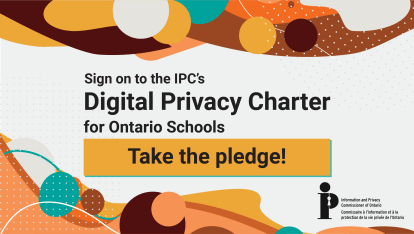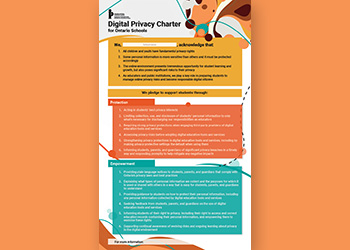- Guidance for Organizations
- Access to information
- Protection of privacy
- Health privacy
- CYFSA Part X
- Annual statistical reporting FAQ
- Policy consultations
Digital Privacy Charter for Ontario Schools

Ontario schools have an essential role in preparing young people to be safe and responsible digital citizens and empowering them to exercise their privacy and access rights.
The emergence of the internet, smartphones, cloud-based platforms, social media, and artificial intelligence have created many new risks in the digital landscape.
Recognizing this, the IPC has developed a Digital Privacy Charter for Ontario Schools in consultation with educators, educational institutions, and youth and parent advocates.
School administrators and school board officials can demonstrate their commitment to making student privacy a top priority by signing on in support of the charter.
The charter consists of twelve high-level commitments that codify current and emerging best practices, many of which are grounded in statutory requirements under the Municipal Freedom of Information and Protection of Privacy Act.
They are intended to support students in the digital environment by:
- promoting strong privacy protections in digital education tools and services used by schools
- encouraging ongoing learning about privacy in the digital environment
- empowering students to understand and exercise their privacy and access rights
By adopting the digital privacy charter, school boards across Ontario can demonstrate a strong public commitment to protect our students' digital privacy, support accountability and transparency, and strengthen trust in Ontario’s schools.
Do you have questions about the charter? Email @email.
Additional resources
FAQs
What is the Digital Privacy Charter for Ontario Schools?
The Digital Privacy Charter for Ontario Schools outlines 12 commitments Ontario schools can adopt to enhance support for young people in the digital environment by:
- promoting strong privacy protections in digital education tools and services used by schools
- encouraging ongoing learning about privacy in the digital environment
- empowering students to understand and exercise their privacy and access rights
Don’t privacy laws already protect children and youth and hold educational institutions accountable?
Yes, privacy laws are in place in Ontario to protect children and youth and hold educational institutions accountable and the digital privacy charter is consistent with those laws and represents current and emerging best practices.
Who can adopt the digital charter and its commitments?
The charter and its commitments are intended primarily for Ontario schools and school boards, but can be adopted by any institution or organization that collects, uses, and discloses the personal information of children and youth.
How can I support the charter?
The collective voice of parents, teachers, and school board officials can powerfully shape policies and practices within Ontario’s schools. Expressing support for the digital privacy charter by communicating with local school board trustees, directors of education, supervisors, and principals ensures that the digital safety of our children and youth is at the forefront of educational strategies and policies.
Parents and guardians:
Your voice is vital! Start a conversation with your child’s teachers and school administrators about the importance of digital privacy to help create momentum for the charter. Engage in school meetings, discuss with other parents, and communicate your support for the charter.
Educators:
Advocate for the adoption of the charter at your school. Use it as a guideline for digital activities in the classroom. Connect with us for further insights on how to implement the charter and raise awareness about digital privacy among your students and colleagues.
School board officials:
Bring the charter for serious consideration at board meetings and policy review sessions. Analyzing and adopting the charter’s commitments could set a strong framework for digital privacy across your school board. Your endorsement and application of the charter can create a secure digital environment for students.
What is the role of the IPC?
The IPC oversees the province’s access and privacy laws, ensuring that public institutions, health care providers, and child service providers comply with the law regarding the collection, use, and disclosure of personal information while maintaining its privacy and security. The IPC handles a variety of responsibilities including resolving access to information appeals and investigating privacy complaints.
Part of our mandate is to research and educate the public on privacy and access to information issues. Read about our strategic priorities and other activities in support of Children and Youth in a Digital World.
Where can I learn about youth digital privacy rights and how to and empower young people in the digital world?
Where can I learn about youth digital privacy rights and how to and empower young people in the digital world?
The IPC is building on important research and initiatives around the world.
Learn more:
- Putting the interests of young people at the forefront of privacy (FPT resolution, Canada)
- Resolution on children's digital rights (GPA resolution, international)
- United Nations Convention on the Rights of the Child (UNCRC) – General comment No. 25 (2021) on children’s rights in relation to the digital environment
- UK Children’s Privacy Code

